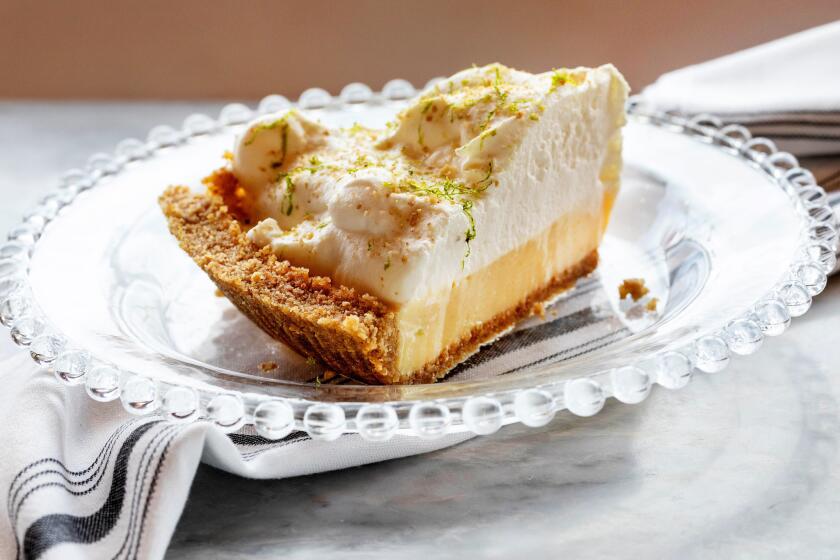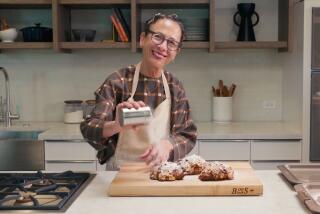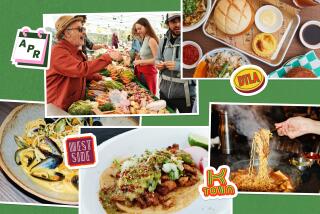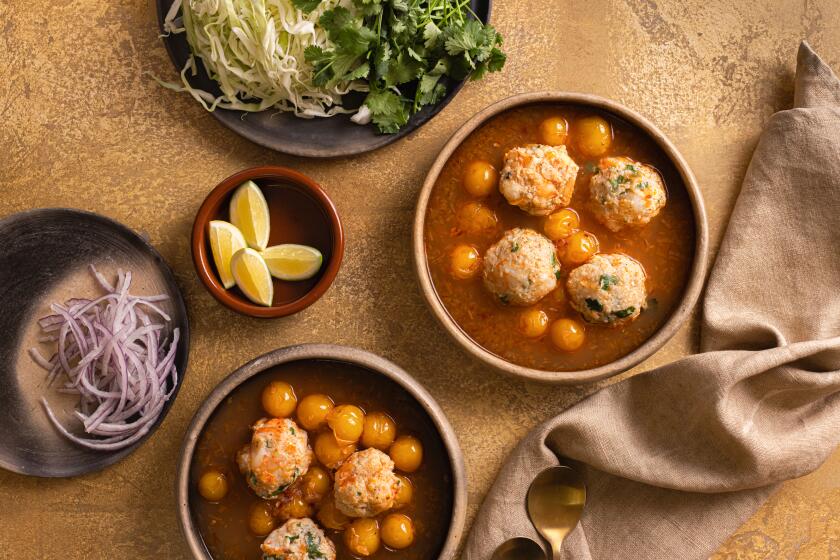Q&A: Get to know Patricia Escárcega, new restaurant critic for the L.A. Times
Patricia Escárcega was recently named one of the Food section’s new restaurant critics (along with Bill Addison, whose Q&A you can find here). Before joining the L.A. Times, Escárcega worked as a dining reporter at the Arizona Republic and served as the restaurant critic for the Phoenix New Times for three years. She has worked as a proofreader, amateur librarian and, as she told me, “too many service industry gigs to list.” She holds both an M.F.A. and a master’s in library science from the University of Arizona, Tucson. A Southern California native, Escárcega was born in Riverside to a family of naranjeros (citrus workers).
What about being a restaurant critic in Los Angeles excites you? What do you think this city has to offer that’s different or unique relative to the rest of the country?
I remember reading a Werner Herzog profile last year in the L.A. Times where he talked about Los Angeles as a city of substance and creative energy. I appreciate that characterization. I grew up hearing tired jokes and cliches about Los Angeles as a vapid, culture-less place. Those kinds of characterizations pain me because they ignore the city’s history and its incredible diversity.
There is diversity here in every sense — cultural, racial, agricultural, geographical — and it energizes the city and its food scene. There is a sense that anything can happen in Los Angeles, and what happens here increasingly helps steer the national food conversation.
You come from Riverside by way of Phoenix — what about your background do you think influences your taste in food and restaurants?
Riverside, and the Inland Empire at large, is more often derided than praised, even though, historically, the region has been instrumental in bringing wealth to Southern California and shaping its mythology. My parents met while picking oranges in Riverside in the early 1970s. So I grew up in a place that few people would probably describe as cool or fashionable, and I grew up in a family without a lot of money.
I think a lot about uncelebrated places, uncelebrated people, and by extension, uncelebrated cuisines. I’ve developed a deep appreciation for the foods and people historically ignored by food media — genres like Mexican American cooking, which still doesn’t get the respect and interest that it merits. I don’t have patience for food journalism that betrays a lack of curiosity and historical context, and which doesn’t locate cultural interest and value in all forms of cooking.
What do you think the role of a critic should be in the restaurant world? Do you see yourself as purely an evaluator, or something more?
When it’s done well, food criticism can be a vital form of cultural criticism, and the food critic is an interpreter of culture. That sounds kind of high-minded and nebulous, but I really believe that how we eat shapes our identities in ways we probably don’t even register most of the time. Of course, food criticism also has a practical evaluative function that’s part of the long tradition of service journalism. The best food criticism manages to do both.
I don’t have patience for food journalism that betrays a lack of curiosity and historical context.
— Patricia Escárcega
Do you go to great lengths to preserve your anonymity? Do you think anonymity is essential to criticism?
I don’t think anonymity is essential to criticism, but I do think it has plenty of advantages. Practically speaking, it makes the job easier. I appreciate being able to observe and evaluate without being fussed over or schmoozed. More to the point, anonymity is useful in establishing a clear firewall between the restaurant and the critic.
Working anonymously, or at least trying to, is a way of communicating that intent. I do think people get too caught up in the anonymity question, though. I can only control so much, so I don’t agonize over it.
Can you think of any milestone food moments in your life that you think were essential to the development of your appreciation of food?
I don’t have one big defining food moment, but I have a lot of little ones. One involves going to my Tía Carmen’s house in Riverside. She liked to make flour tortillas from scratch, slather them in hot butter and then roll them up into tight, flauta-like rolls. It was such a simple treat, but so delicious and enormously satisfying. To this day, if I ever come across fresh-made flour tortillas with butter on a restaurant menu (it rarely happens, but I do know a couple of spots), my heart does a little leap of joy.
I also vividly remember the first time I went to my mom’s hometown — Tepatitlán de Morelos, Jalisco — and ate fresh, unripened queso adobera (a type of cheese from western Mexico). I was so taken with the cheese that I stuffed a whole backpack full of bricks of it and took them back home.
Bill Addison is one of two restaurant critics who recently joined the Los Angeles Times.
Since I grew up in a family where a lot of people worked picking oranges or worked in citrus packing houses, there were usually big bags of fresh citrus around the house. If there’s one scent I remember from being a kid, it’s the scent of Washington navel oranges, which as any Riversider will tell you, is the best orange of them all. I have a lot of memories of stopping at citrus stands tucked into orange groves to buy seasonal fruits and nuts. Most of those citrus stands are gone now.
If 2019 Patricia could give advice to 2009 Patricia, what would it be?
It’s getting better, but food journalism still has a pervasive race and class problem. I would tell my younger self that it’s OK not to fit the mold of what might seem like a traditional food critic. I’m not white or male. My family didn’t travel much and we very rarely ate out. We didn’t have the money for it. Feeling like an outsider isn’t exactly fun, but it affords you insights. So the advice I would give to my younger self is the same advice I would give to any insecure kid with big dreams but maybe no conventional pedigree: Speak up. There are things you know that other people don’t. You have a point of view and it needs to be heard.
You mentioned you’ve worked a lot of odd jobs in your life to pay the bills. Anything notable stick out in your mind?
I worked in this book warehouse when I was an underemployed freelance writer and desperate for money to pay for our wedding. I thought it was just going to be pulling books off of shelves, but I ended up operating these things called pallet jacks and moving around these massive piles of books. I had to rely on the goodwill of my coworkers to not cause any major damage there. And I can now confidently say I’m better suited to be a restaurant critic than a pallet jack operator!
More to Read
Eat your way across L.A.
Get our weekly Tasting Notes newsletter for reviews, news and more.
You may occasionally receive promotional content from the Los Angeles Times.








